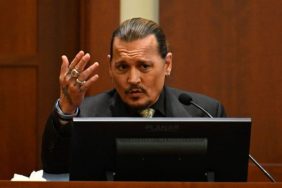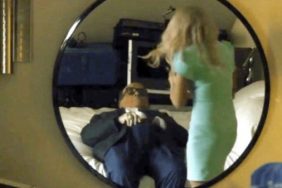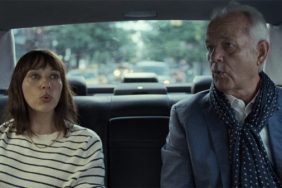In the new indie rom com Sleeping With Other People, there’s a particular scene that kind of leaves you breathless. It involves the film’s two stars Alison Brie and Jason Sudekis, with Sudekis’ character Jake demonstrating on a wide mouth orange juice bottle how Brie’s character, Lainey, should be masturbating to bring herself to climax. It’s intimate, it’s sensual, it’s very sexy, and it’s surprisingly confronting.
“I don’t think any of us thought or realised how sort of uncomfortable and revolutionary that scene is,” admits the film’s director Leslye Headland. “I don’t think any of us really thought it through in the sense of like the audience is going to be sitting there listening to someone describe the female genitalia. It really didn’t occur to me until I saw it with an audience how sort of show-stopping it is.”
That’s kind of the general sense you get from Sleeping With Other People as a whole – that it’s breaking down a lot of boundaries and societal hook ups by just genuinely being honest. The film is the story of two friends, the aforementioned Jake and Lainey, who lose their virginity together in a random college hook up only to reconnect more than a decade later to find that both are incapable of maintaining successful relationships and decide to forge a partnership together based on everything except sex.
It’s broadly been described as a romantic comedy for the Tinder generation, thanks to the promiscuous nature of its two main leads, but as writer and director Headland explains, the thought process behind the film was actually about giving a voice to the feelings that she herself, as well as many of her friends and people of this generation have towards modern dating.
“The reason I write is to create cartoon characters to feel my feelings for me,” she explains. “Like my feelings and my experiences just feel so big and I’m sort of honestly scared by them. So basically it’s making a big joke out of the stuff that really scares me the most, like being alone, being unable to commit to another person, just basically sort of wondering if I was just incompatible with people.”
“There are some people that are very successful in courting romantic relationships,” she continues. “I was never really one of them. I’ve had some very successful relationships and then I’ve also had some that are just totally [sigh/yells woo!] were horror shows. So yeah that was really how it started.”
And it’s true, through that exploration of herself, Headland has managed to put her finger on the pulse of what encapsulates the modern dating experience. Jake represents the notion that there’re plenty of people out there to “date” but no one you really feel like you can commit to.
Meanwhile Lainey represents being desperately in love with someone and not being able to shake that love, despite knowing that they’re totally wrong for you. I tell her that I can relate to both characters for better or worse that I actually plan to show the film to my mum, so she’ll get off my back for a while about not being in a relationship. Headland laughs and admits she’s in the same position.
“I think my parents were both really surprised at how romantic it was and I was like, ‘Yeah, just because we don’t really have the same etiquette of dating as you guys did from your generation doesn’t mean we aren’t romantic people or that we don’t want love or that we don’t long for, maybe not a soulmate but a partner. A person that’s going to walk through this life for us.’ So I think they were surprised and I think that the older generation will be as well because we’re not all about fucking but that’s just the way you get to know someone now – is by fucking them.”
But along with the reality of her own experiences, a lot of the film’s charm comes from its stars, especially Alison Brie, who steps out in one of her first leading roles in the film after success on TV shows like Mad Men and Community.
“Ali has always seemed to me to be like the ‘good girl / bad girl’,” explains Headland. “Like the character of Lainey is so interesting because basically Lainey is the reason that a studio in Hollywood wouldn’t make this movie because she’s having sex with a man that’s not her boyfriend and it’s not a fun guy type and not what you might call post-sixth wave feminism sex where you’re like, ‘I’m just going to fuck like the guys’ and what people expect her to be. She’s actually super hung up on and essentially addicted to somebody that is just so wrong for her and that’s a real problem that she has to overcome.”
Headland elaborates that it was Brie’s girl next door charm that really made the character work. “I thought Ali was somebody that would be able to do all of that and I hate to use the term but still remain very ‘likeable’ to the audience and that the audience wouldn’t make these judgements about her because she’s so endearing and she’s so endearing on her shows – both Mad Men and Community.
If you watch either of those shows you know she plays similar characters where they’re innocent but they’re not stupid. It makes sense why she’s making this mistake. It’s not like she’s being unbelievable and that any girl could make an honest mistake like getting hung up on somebody like that jerk off.”
Sudekis on the other hand has proven himself as a strong leading man in comedy since leaving Saturday Night Live a few years ago. His ability to connect with the audience while overcoming character flaws is something headland chalks up to his abilities as a comedian and not just an actor.
“It’s been my experience and it’s why I love working with comedic actors is that they’re so sensitive and they’re so in tune with their pain. I knew Jason would be able to pull of Jake’s sort of rakish, sleeping with somebody’s best friend and still sort of try to talk her into why that might be okay. I think both of them do a really good job of making you fall in love with people that you might otherwise not really want to have dinner with.”
Headland, who made her name by directing the breakout, low budget 2012 hit Bachelorette, says one of the best parts of working with these characters and in this style is that she gets to collaborate and explore on set.
“I story board and I plan things out and I’m very particular about how things should go but I also just have a very – I just know when we’re on set everything’s going to change. Especially shooting independent films you just don’t have the luxury of knowing how something’s going to play out or whether or not you’re going to have something. So I like that aspect of film making. I don’t feel like film making should be controlled and contained in order to be good. I think that part of the fun of doing what we do instead of writing a novel or painting a painting is that you’re working with humans and so you’re going to get very different experiences working with different people. I sort of embrace improve and embrace actor suggestions.”
And when she means collaboration, she means all forms of collaboration – including that now infamous masturbation scene, which she admits required a lot of collective input.
“We really tried to approach it as realistically as possible. Maybe not in the tone of the movie but in the performances. So that scene it was like, ‘Okay so you’re telling her and teaching her how to love herself’ and we were all talking about how we masturbate we were all really open with each other and it really wasn’t until I started seeing it with audiences that I was like ‘Oh wow, we really are sort of sitting here for a long time talking about… this could go really wrong!’ And it really wasn’t until post that I really realised what a punch it packed.”
Get ready for that punch when the film reaches Australian cinemas on October 29.









